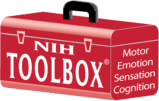Motor
Motor function involves complex physiological processes and requires the integration of multiple systems, including neuromuscular, musculoskeletal, cardiopulmonary, neural motor, and sensory-perceptual systems. Motor function is indicative of current physical health status, burden of disease, and long-term outcomes, and is integrally related to daily functioning and quality of life.
Motor performance includes voluntary control of both fine and gross motor functions including dexterity, strength, balance, locomotion, and endurance. Motor performance also requires the interaction of multiple body systems, including the nervous, muscular, cardiovascular, and sensory-perceptual systems.

